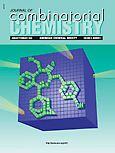In the inaugural issue of Volume 11 of the Journal of Combinatorial Chemistry Anthony Czarnik commented on the concept of Distributed Drug Discovery, D3. This concept was introduced in papers in that issue by Profs William Scott and Martin O'Donnell of the IUPUI (Indiana University-Purdue University Indianapolis).
The three papers are:
Distributed Drug Discovery, Part 1: Linking Academia and Combinatorial Chemistry to Find Drug Leads for Developing World Diseases
Distributed Drug Discovery, Part 2: Global Rehearsal of Alkylating Agents for the Synthesis of Resin-Bound Unnatural Amino Acids and Virtual D3 Catalog Construction
Distributed Drug Discovery, Part 3: Using D3 Methodology to Synthesize Analogs of an Anti-Melanoma Compound
I encourage you to get a copy of the first issue of the Journal of Combinatorial Chemistry and read the papers directly. The concept around D3 can be summarized by this statement from the first of the three papers "Distributed Drug Discovery (D3) proposes that if simple,inexpensive equipment and procedures are developed for research in each of the core drug-lead discovery stages, computational chemistry, synthetic chemistry, and biochemical screening, this large research challenge can be divided into manageable smaller units and carried out, in parallel, at multiple academic and industrial sites." Clearly we see our efforts here at Collaborative Drug Discovery as supportive of D3 and Tony Czarnik's editorial recognizes us as working to support his "noble goal".
Tony includes a comment from our own Barry Bunin where Barry announces our efforts to support the work of IUPUI. We are providing the IUPUI-CDD database making available all the reactants, reagents and products. This database will be updated over the coming months as the work is expanded. The Distributed Drug Discovery (D3) database is a virtual catalog of 48,608 unique acylated unnatural amino acid derivatives obtained from a combinatorial enumeration. If you re interested in accessing this database you can register for a free read-download account with Collaborative Drug Discovery (CDD) here. We have also put together a thorough tutorial regarding how to use the D3 database on the CDD website and you can find it on the site at the same address.
This is one of many databases that you will see added to the CDD website over the next few months and we encourage you to make full use of these valuable resources as they become available. Don't forget to read the papers in JCC. It's a different model for Drug Discovery but at a time when Pharma R&D is challenged to produce more drugs there MUST be a change in strategy. Collaborations across the industry and with academia are surely going to be a part of the strategy and we will visit some of the approaches to this in later postings. We are already enabling the shift.
This blog is authored by members of the CDD Vault community. CDD Vault is a hosted drug discovery informatics platform that securely manages both private and external biological and chemical data. It provides core functionality including chemical registration, structure activity relationship, chemical inventory, and electronic lab notebook capabilities!
CDD Vault: Drug Discovery Informatics your whole project team will embrace!
Other posts you might be interested in
View All Posts
CDD Vault Updates
2 min
June 17, 2025
CDD Vault Update (June #2 2025): Bulk Register Sequences with Custom Monomers, Set X-axis Ranges in Plots, Filter AI Bioisostere Suggestions, Inventory Debits from ELN
Read More
CDD Blog
1 min
June 17, 2025
CDD Vault Curves vs. GraphPad Prism: Which Tool is Best for Early-Stage Drug Discovery Data Analysis?
Read More
CDD Blog
1 min
June 17, 2025
Why We Committed to Amazon Web Services — And What It Means for You
Read More



